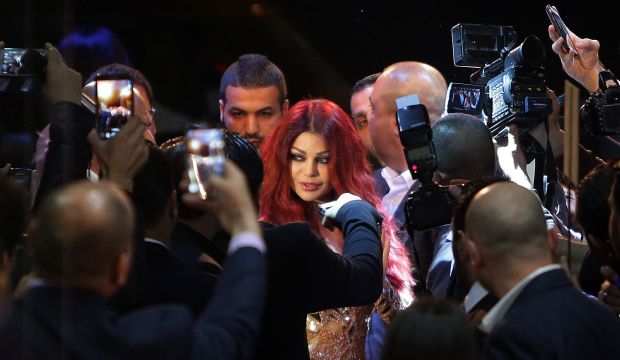
A file picture taken on April 8, 2014, shows Lebanese pop star Haifa Wehbe arriving for the Premiere of her movie ‘Halawet Rooh’ at a movie theatre in the town of Dbayeh, north of Beirut. (AFP Photo/Joseph Eid)
London, Asharq Al-Awsat—Egyptian interim Prime Minister Ibrahim Mahlab has ordered Haifa Wehbe’s latest cinematic offering, Halaweet Rooh (Beauty of the Soul), withdrawn from cinemas, a state-owned news agency reported on Wednesday. The film had initially been released on April 3.
The film tells the story of Rooh (Wehbe), a nightclub singer who becomes the object of desire for men in her working class neighborhood after her husband moves away. The movie is directed by Sameh Abdelaziz and written by Ali Al-Gendy.
Egypt’s state-owned MENA news agency reported that Mahlab had taken the decision to withdrawn the film from for containing “excessive use of sexual innuendo.”
According to local media, Halaweet Rooh was also withdrawn from UAE cinemas on Thursday morning. It was unclear whether the National Media Council—the UAE body tasked with approving films for release—had taken the decision, or local distributors.
Egypt’s independent Al-Masry Al-Youm newspaper criticized the film in a review entitled “Halaweet Rooh: How to produce an Egyptian porn movie?” earlier this month. Reviewer Ramy Abdel Razak writes, “The movie does not miss an opportunity to show off Haifa’s body, in a way that seems spontaneous and unintentional, in the kitchen, or the lounge, or the bedroom.”
Well-known Egyptian film critic Sherif Awad told Asharq Al-Awsat: “We were all surprised by the prime minister’s intervention to withdraw the film. The film contains vulgarity and is objectively away from Egyptian society and its spirit is non-Egyptian, even if it is set in an Egyptian neighborhood.”
The Egyptian Board of Censors informed Asharq Al-Awsat that the decision to review the movie was based on two particular scenes due to their “unacceptable and unjustifiable content.” One of those scenes depicted the rape of the character played by Haifa Wehbe, and the other was love scene between the main character and another actor.
But the film’s producer, Mohamed Al-Sabki, dismissed the criticism, saying the film contains “nothing that outrages public decency” in an interview with Al-Mehwar TV. He had earlier denied that the film was withdrawn in the UAE and Egypt in an interview with Al-Watan News, describing the claims as “unfounded rumors.”
The film’s star, Lebanese singer and actress Haifa Wehbe, has not officially commented on the reports that the film has been withdrawn from cinemas but retweeted a picture of a cinema showing the movie, along with the message that the film had broken a box office record in Egypt. In a subsequent Facebook message, she wrote: “This is a ministerial decision and I respect it as part of my respect for official bodies.”
“The reports that [ex-husband] Ahmed Abu Hashima was involved in the ministerial decision to stop the screening of the film is not true,” the statement on Facebook added, in response to rumors that her ex-husband, a prominent Egyptian businessman, had a hand in the decision.
The interim prime minister’s decision has been criticized by some parties. Egyptian journalist and blogger Wael Abbas tweeted: “No to the withdrawal of Halaweet Rooh. No to movie censorship. We are all Haifa Wehbe.”
Egyptian blogger Ahmed Kadry tweeted: “The irony of the Haifa Wehbe movie being pulled from Egypt is that it wasn’t done by the big, bad Islamists.”
This is not the first time that the Lebanese pop star and actress has found herself at the center of controversy. In 2009, her song Baba Fein (“Where’s Daddy?”) was criticized for appearing to refer to Nubians as “monkeys.” Wehbe apologized for the lyrics, saying that she had not written the lyrics and had been unaware of their racial connotations.
